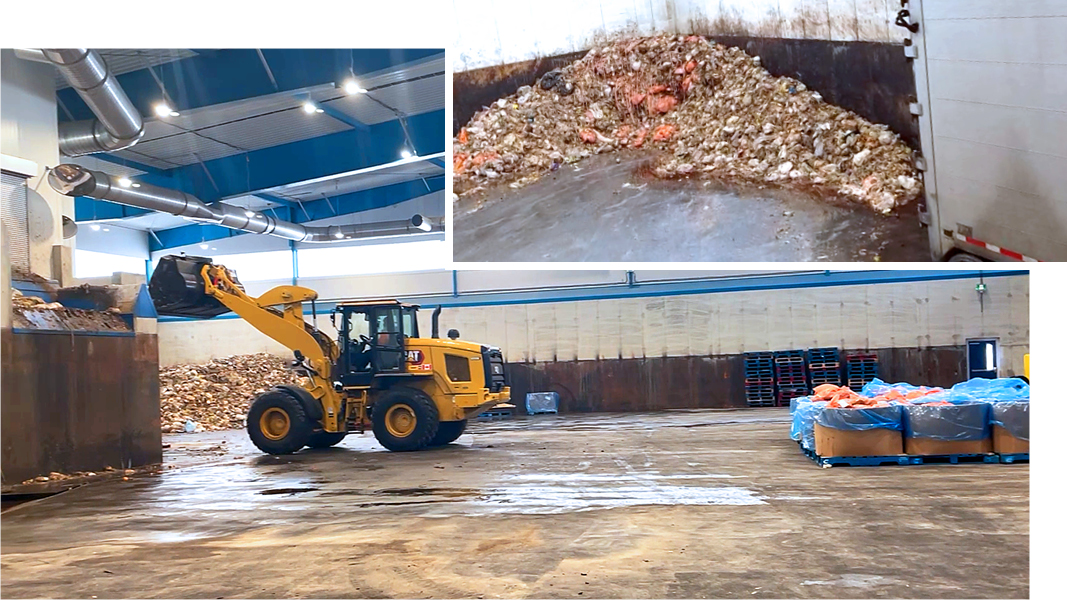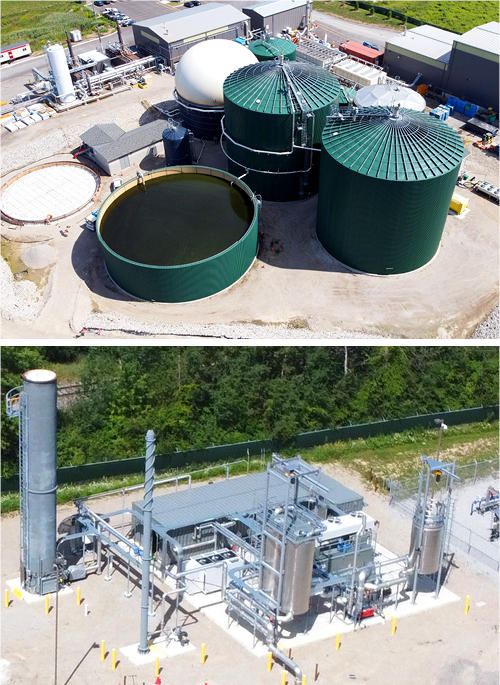Top: Depackaged and slurried food waste is transported to the StormFisher anaerobic digester in London, Ontario.
Lilian Schaer
An innovative food waste recovery center opened its doors near Drumbo, Ontario (Canada) this summer. Located between Kitchener and London, the $20 million facility was more than two years in the making, and is a partnership between StormFisher, a company specializing in circular economy and decarbonization solutions, and Generate Capital, a leader in sustainable infrastructure.
The new Drumbo site enables StormFisher to preprocess green bin organic waste it receives from Halton Region, Toronto, and Stratford. The municipal green bin programs collect all residential organics, as well as material from schools and municipally-owned buildings. The facility also depackages expired and off-spec produce and other food waste. The depackaged organics are taken to StormFisher’s anaerobic digester in London.

Loose food waste (inset, top right) is unloaded on the tipping floor. A bucket loader places it in the hopper of the Scott Equipment Mega Thor (left). Pallets of packaged goods are seen on right. Photos courtesy of StormFisher
The new facility, designed and built by U.S. firm RRT Design and Construction, has capacity to process 110,000 tons of source separated organics annually, including items like off-spec hotdogs, juice boxes and candy, contaminated organic waste, and food past its prime. Scott Equipment’s Mega Thor hammermills are used for the preprocessing. Packaging is removed from off-spec food products manually, but all other source separated organics are received on a tip floor where they are visually screened for large contaminants before being loaded into the feed hoppers of the depackager.
“We see a contamination rate of 10% to 25% in green bin waste we receive here in Drumbo,” explains Brandon Moffatt, StormFisher owner and Vice President. “This is where we separate out the big contaminants like plastics and knives, which are then sent to landfill.” The rest is sent to London, where grit and glass are separated out using hydrocyclones before entering the digester. Biogas is upgraded at the plant to renewable natural gas (RNG). Digested solids are used by local cash crop farmers as fertilizer.
Most resource recovery facilities of this kind are added into existing transfer facilities. This wasn’t possible at the London site, leading to StormFisher’s first purpose-built center in Drumbo. It bought the Drumbo site about two and a half years ago, where the proper permitting was already in place because the site had housed a food and beverage waste preprocessor. According to Moffatt, the existing permit dramatically sped up the time his company needed to build and bring the new food recovery center online, making it possible in two years instead of the usual four. The new site also marks the first time StormFisher is using a thermal oxidizer for odor control, where air is combusted instead of passing through a biofilter.
“The Drumbo facility is the first new infrastructure in the Ontario organic waste industry in several years, and it’s already close to capacity,” notes Moffatt, adding there is pent up demand for additional food recovery capacity in Ontario. “There’s a need for $1 billion in investment in Ontario for green bin and industrial, commercial and institutional organics recycling.”
He envisions a hub and spoke model where waste would come to a preprocessing facility like Drumbo for treatment before going to the StormFisher biodigester in London or to an on-farm digester like the one to be located at London Dairy, a large nearby dairy farm. That’s where StormFisher is currently developing an on-farm anaerobic digestion system to codigest food waste with the farm’s manure and create low carbon intensity renewable natural gas (RNG). The project is expected to come online in 2023.
Being able to handle prepackaged waste is a significant milestone for both StormFisher and the food industry as more and more major retailers and food processors are targeting zero landfill and carbon neutral operations. StormFisher recycles products for Maple Leaf Foods, for example, a global leader in carbon neutral food production. Maple Leaf is building a new $750-million poultry processing plant near London Dairy.
Bioplastics Production
StormFisher is also pushing the envelope in the field of bioplastics production. Its Drumbo facility will host a demonstration project by Genecis Bioindustries Inc. to develop, scale and integrate a new biotechnology platform to upcycle food waste into bioplastics. The project is supported by $6 million in collaborative funding from Next Generation Manufacturing Canada (NGen), which facilitates development of advanced manufacturing. The NGen grant is helping to fund the project construction, which Moffatt hopes will get under way by spring 2022.
Together, the two companies will integrate a demonstration-scale unit into the StormFisher plant to develop high-value PHA (polyhydroxyalkanoate) bioplastics, an alternative to petroleum-based plastics, to create a circular, biobased system. Initial products made with PHA resins are expected to be used in packaging, agricultural and medical plastics, and additive manufacturing filaments. “I heard the CEO of Genecis speak several years ago about using food waste to make plastic and we’ve stayed in touch,” says Moffatt. “I offered to help in any way I could and that’s how we came to host their demonstration plant in Drumbo. We can’t get from lab to plant right away; we’ll need time to develop the process and then scale up from lab to pilot demonstration.” He adds that the technology could generate more revenue per ton of food waste, improving profitability for organics recycling operations.
OMAFRA Increases Off-Farm Waste Limit
Sustainable organics recycling and the need for clean energy in Ontario also received a boost from the provincial government this summer. Regulatory changes by the Ontario Ministry of Agriculture, Food and Rural Affairs (OMAFRA) allow farms with digesters to match on-farm waste like manure, corn stover or other agricultural by-products one to one with off-farm organics to feed their digesters. The increased allowance is up to 44,100 tons/year of off-farm material like food waste. This boosts on-farm digester capacity to about 88,200 tons/year, greatly increasing both the farm’s RNG production potential and revenue generated through tipping fees. Previously, the off-farm waste was capped at 11,020 tons annually, which made the economic feasibility of such projects unworkable for most farms.
Although more farms will now be able to build this kind of infrastructure, not every farm yet has the reliable connection to the natural gas grid that is needed for RNG production. Farms must also be able to supply the pipeline year-round with consistent volume, and as of yet, RNG is more expensive than conventional, fossil fuel-based gas.
Moffatt is hopeful about what the future holds, though. “We are in the early stages of this in Ontario, and we are one of the first out of the gate,” he notes. “There is insatiable demand for RNG that is fueled by corporate net zero targets and natural gas utilities seeking RNG mandates from their regulators.” He adds that RNG sells at $20 to $30 per gigajoule. “Inquiries to buy our energy are increasing, particularly from natural gas utilities.”
StormFisher had its start in 2006 as a developer of decarbonization solutions and clean energy strategies before also expanding into operations. Its London, Ontario facility was named 2021 Project of the Year by the Canadian Biogas Association.
Lilian Schaer is an agricultural writer, editor and communications specialist at Agri-Food Project Services Ltd. in Guelph, Ontario, Canada.














